Filter by

Consciousness :confessions of a romantic reductionist
"What links conscious experience of pain, joy, color, and smell to bioelectrical activity in the brain? How can anything physical give rise to nonphysical, subjective, conscious states? Christof Koch has devoted much of his career to bridging the seemingly unbridgeable gap between the physics of the brain and phenomenal experience. This engaging book--part scientific overview, part memoir, part…
- Edition
- -
- ISBN/ISSN
- 9780262301787
- Collation
- 1 online resource (xii, 181 pages)
- Series Title
- -
- Call Number
- -

Zen-Brain Horizons: Toward a Living Zen
A neurologist and Zen practitioner clarifies the benefits of meditative training, drawing on classical Buddhist literature and modern brain research."In Zen-Brain Horizons, James Austin draws on his decades of experience as a neurologist and Zen practitioner to clarify the benefits of meditative training. Austin integrates classical Buddhist literature with modern brain research, exploring the …
- Edition
- -
- ISBN/ISSN
- 9780262321150
- Collation
- 1 online resource (xxi, 273 pages) :color illustrations
- Series Title
- -
- Call Number
- -

Qualitative Analysis and Control of Complex Neural Networks with Delays
Dengan berkembangnya teori neural networks, banyak model dan konsep stabilitas telah berkembang. neural networks berulang (RNN), yang dikenal karena perannya dalam memori asosiatif dan penyimpanan informasi, merupakan contoh evolusi ini. Kaitan antara neural networks tiruan (JST) dan neural networks biologis (BNN) menggarisbawahi gagasan bahwa JST, meskipun versi BNN yang disederhanakan secara …
- Edition
- 34
- ISBN/ISSN
- 978-3-662-47484-6
- Collation
- -
- Series Title
- Studies in Systems, Decision and Control
- Call Number
- 006.32 WAN q

How the body shapes the way we think : a new view of intelligence
"A Bradford book."An exploration of embodied intelligence and its implications points toward a theory of intelligence in general; with case studies of intelligent systems in ubiquitous computing, business and management, human memory, and robotics.OCLC-licensed vendor bibliographic record.
- Edition
- -
- ISBN/ISSN
- 9780262281553
- Collation
- 1 online resource (xxiv, 394 pages) : illustrations
- Series Title
- -
- Call Number
- 001 PFE h
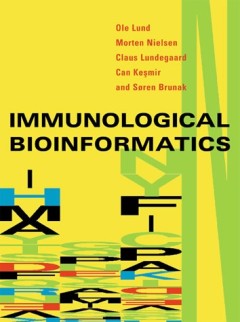
Immunological bioinformatics
"This book offers a description of bioinformatics techniques as they are applied to immunology, including a succinct account of the main biological concepts for students and researchers with backgrounds in mathematics, statistics, and computer science as well as explanations of the new data-driven algorithms in the context of biological data that will be useful of immunologists, biologists, and…
- Edition
- -
- ISBN/ISSN
- 9780262323338
- Collation
- 1 online resource (xii, 296 pages, 24 unnumbered pages of plates) : illustrations (some color).
- Series Title
- Computational Molecular Biology
- Call Number
- 001 LUN i
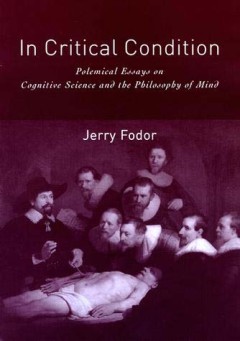
In critical condition : polemical essays on cognitive science and the philoso…
"A Bradford book."Doing philosophy, according to Jerry Fodor, is like piloting: The trick is to find an object of known position and locate yourself with respect to it. In this book, Fodor contrasts his views about the mind with those of a number of well-known philosophers and cognitive scientists, including John McDowell, Christopher Peacocke, Paul Churchland, Daniel Dennett, Paul Smolensky, a…
- Edition
- -
- ISBN/ISSN
- 0585078092
- Collation
- 1 online resource (x, 219 pages).
- Series Title
- Representation And Mind Series
- Call Number
- 100 FOD c

The new science of the mind :from extended mind to embodied phenomenology
An investigation into the conceptual foundations of a new way of thinking about the mind that does not locate all cognition "in the head." There is a new way of thinking about the mind that does not locate mental processes exclusively "in the head." Some think that this expanded conception of the mind will be the basis of a new science of the mind. In this book, leading philosopher Mark Rowl…
- Edition
- -
- ISBN/ISSN
- 9780262289733
- Collation
- 1 online resource (x, 249 pages)
- Series Title
- -
- Call Number
- -
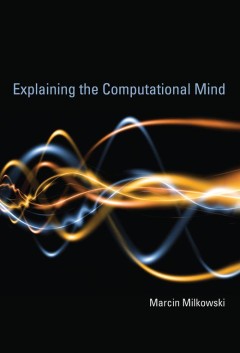
Explaining the computational mind
In this work, Marcin Milkowski argues that the mind can be explained computationally because it is itself computational - whether it engages in mental arithmetic, parses natural language, or processes the auditory signals that allow us to experience music.OCLC-licensed vendor bibliographic record.
- Edition
- -
- ISBN/ISSN
- 9780262313919
- Collation
- 1 online resource (x, 243 pages)
- Series Title
- -
- Call Number
- -
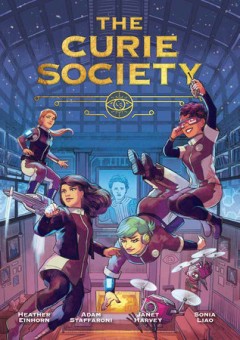
The Curie Society
"An action-adventure original graphic novel, following a team of young women recruited by an elite secret society--originally founded by Marie Curie--with the mission of supporting the most brilliant female scientists in the world. The heroines of the Curie Society use their smarts, gumption, and cutting-edge technology to protect the world from rogue scientists with nefarious plans. Follow rec…
- Edition
- -
- ISBN/ISSN
- 0262371758
- Collation
- 1 online resource (163 pages) :color illustrations.
- Series Title
- -
- Call Number
- -
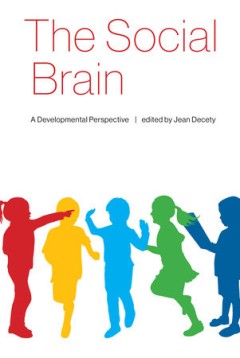
The social brain :a developmental perspective
"This new volume brings together a range of empirical and theoretical views from both developmental psychology and developmental neuroscience, and cover a core set of questions and topics that concern the development of the social mind. The basic topics about the origins, development, and biological bases of the human social mind include, but are not limited to, face and voice recognition, atta…
- Edition
- -
- ISBN/ISSN
- 0262358964
- Collation
- 1 online resource (xii, 426 pages) :illustrations (black and white).
- Series Title
- -
- Call Number
- -
 Computer Science, Information & General Works
Computer Science, Information & General Works  Philosophy & Psychology
Philosophy & Psychology  Religion
Religion  Social Sciences
Social Sciences  Language
Language  Pure Science
Pure Science  Applied Sciences
Applied Sciences  Art & Recreation
Art & Recreation  Literature
Literature  History & Geography
History & Geography